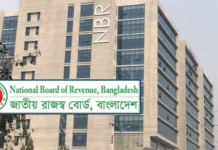


Despite having a strong emerging regulatory framework and a relatively mature market, public-private partnership (PPP) projects in Bangladesh have attracted far lower investments than requirements owing to implementation challenges, lack of long-term financing, and dated laws.
So far, $6.74 billion has been invested in PPP projects against the requirement of $384 billion by 2030, according to a publication of the Asian Development Bank (ADB).
The figures were cited in the ADB’s “Public Private Partnership Monitor Bangladesh”, which was unveiled at an event at the Hotel InterContinental in Dhaka yesterday. Government high-ups, senior officials of the Manila-based lender, economists, and business leaders were present at the launch.
The publication said though the PPP market in Bangladesh is relatively mature, there have been various challenges to PPP implementation.
“Bangladesh has a strong emerging regulatory framework. However, there are still many other steps needed to make PPPs more acceptable.”
The ADB said developing sector-level frameworks and model documents or standard bidding documents is crucial in bringing added transparency and clarity, with the hope that more in the private sector will bid for projects.
“A related goal in attracting more private sector interest is creating robust regulatory mechanisms through independent sector regulators and tariff policies for PPP projects.”
It noted that the lack of long-term financing is a major impediment for PPPs.
“While a few specialised institutions have been developed, there is still a major gap in overall financing requirements of the country, which leads to heavy dependence on foreign or development funding routes,” said the ADB.
It said the dated laws in many sectors and commonly applicable regulations related to the land acquisition will need amendments.
Another challenge of PPPs, according to the PPP Monitor, is the limited capacity of contracting authorities and experience in handling PPP projects.
“While initiatives of the PPP Authority—including the issuance of guidelines and manuals and undertaking capacity development programmes—have led to improved understanding of PPPs, further steps are necessary.”
“Governments’ resources are constrained and we need to be more creative in identifying partnership models between the public and private sector that bring the desired developmental outcomes,” said Ashok Lavasa, vice-president for private sector operations and public-private partnerships at the ADB, at the launching of the publication.
While inaugurating the ADB’s maiden PPP Monitor in Bangladesh, Planning Minister MA Mannan said: “The government is looking forward to investments in the PPP as PPPs can be the alternative initiative for the development of the country.”
Between 1990 and 2019, PPP projects attracted $6.74 billion in investments, of which 76 per cent was contributed by the energy sector, the ADB report said.
Of the sum, the top 10 private companies invested $4.1 billion, or 62 per cent of the total, in 25 PPP projects. Some 12 per cent of the investments were made in the port sector, 6 per cent in the water and wastewater sector, 4 per cent in the roads sector, and 2 per cent in the ICT sector.
Out of 69 PPP projects implemented in Bangladesh, 18 projects were procured through direct appointment, 29 through unsolicited bids, and 25 through a competitive bidding process, said the ADB document.
From 1990 to 2019, only energy sector projects were awarded based on the availability of payment mechanism, with 100 per cent of the projects given by the way of the power purchase agreement or guaranteed payments based on availability.
Thirty-two projects have attracted foreign sponsor-investors, of which 28 are currently active while the others are either cancelled or lapsed in various infrastructure sectors.
Some 58 projects were under various stages of preparation and procurement as of mid-June 2020, said the ADB.
The PPP Monitor provides investors with business intelligence on the enabling environment, policies, priority sectors and deals to facilitate informed investment decisions.
It also gives a diagnostic tool to government counterparts to identify gaps in its legal, regulatory, and institutional framework or issues in particular sectors or with its financial markets.
Later at a panel discussion organised by the ADB, Nihad Kabir, a former president of the Metropolitan Chamber of Commerce and Industry, said there had been reluctance among large foreign investors to come into PPPs in Bangladesh by forming joint ventures with local partners because they are not confident about the capacity of Bangladeshi firms.
“Now is the best time to update the PPP guideline as the country has a PPP Act for more than a decade. The updating is needed to improve efficiency as some internal delays are not helping realise the full potential of PPP.”
The chairperson of the Business Initiative Leading Development, a public-private dialogue platform, suggested involving all ministries to attain the potential of PPP.
Md Abul Bashar, director-general of the PPP Authority, said the ownership is a major challenge in the PPP projects as both parties want to control it.
Muhammad Ibrahim, secretary to the local government engineering department, said the government alone can’t finance PPP projects.
“The private sector’s participation is required to implement the projects in the smaller towns.”
Md Humayun Kabir, secretary to the railways ministry, said the ministry is working to shift Kamalapur Inland Container Depot to Dhirashram in Gazipur and a depot is being constructed there under the PPP model on 4,000 acres of land.
Alamgir Morshed, chief executive officer of Infrastructure Development Company Limited, suggested utilising the potential of the Bangladeshi diaspora to meet the financing demand in PPP projects.
He called for launching offshore bonds, insurance and other bonds to diversify the sources of funds as local banks can’t be seen as a source for long-term financing.
Sukesh Chandra Gain, senior vice-president of NephroPlus of India, the largest network of dialysis centres in the neighbouring nation, said more than 40 per cent cost of dialysis could be reduced in Uzbekistan after taking some projects there under the PPP arrangement.
Masrur Reaz, chairman of the Policy Exchange of Bangladesh, moderated the discussion.










